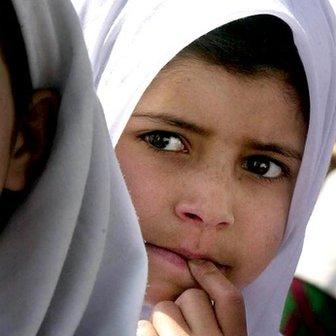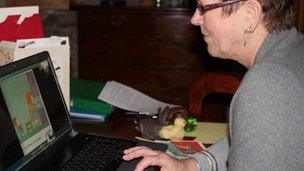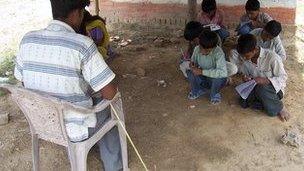TEDGlobal: Cloud schools offer new education
- Published

Many children in the world still have no formal education
Children in developing countries could educate themselves using computers, the TEDGlobal conference in Edinburgh has been told.
Prof Sugata Mitra was outlining details of the first "school in the cloud".
While there would be an online adult moderator at times, the pupils would largely organise themselves, he said.
Meanwhile, an MIT professor laid out his vision of bringing the very best university education to some of the poorest parts of the world.
Prof Anant Agarwal already has one million students enrolled in his online school, edX, an online platform offering courses from some of the highest-profile universities.
He started the non-profit website because he believed it was time for a radical shake-up of education.
"Education has not changed in 500 years - we still herd children like cats into classrooms at 9am."
Such a model might work to a certain extent in the developed world but for many parts of the world, another way of doing things is needed.
The edX platform now has 27 university partners, all offering online courses in a wide range of subjects.
"For the first time, learners are able to take course from some of the best professors in the world," said Prof Agarwal.
The cost of running the platform has been boosted with investments of $60m (£38m) from MIT and Harvard universities and the site is hoping to fund itself in the future by licensing some of the online courses back to universities to offer a more blended learning experience for all students.
'Cloud grannies'
At the main TED (Technology, Entertainment and Design) conference in LA in February, Prof Sugata Mitra was awarded a $1m (£638,000) prize fund to set up a series of cloud schools.
At TEDGlobal he laid out how he intended to spend the money and what a cloud school would be like.
"A school in the cloud is basically a school without physical teachers. We need this because in many places you can't get teachers or the teachers are very bad," he said.
Initially he intends to set up five cloud schools, three in India and two in the UK, near the University of Newcastle where he teaches.
The remotest of the locations is Korakati, a village in eastern India, where he hopes to build a school in the next four months.

Moderators such as Jackie Barrow already work with Indian children
It will be very different from a conventional school - a glass pod filled with computers and with one large screen to allow moderators to Skype in and play a role in the education of the children.
The moderators will be drawn from Prof Mitra's "cloud granny" programme, which is already up and running in the UK and India.
Retired people in the UK connect via Skype to a variety of community-run youth clubs in India, offering a range of activities, with the most popular being reading them stories.
What their exact role in the cloud schools will be is unclear - "I don't know what they will do," said Prof Mitra.
For him, the key part of the project will be to let the children self-organise.
There will be no timetables or curriculum and much of the learning will be left to the children.
"We will let 300 children in on the first day and all hell will break loose. But gradually they will start to organise themselves," he said.
The model for the schools is drawn from the hole-in-the-wall computers that Prof Mitra set up in the slums of India in 1999.
The computers came with no instructions and were simply left for children to explore for themselves. The way they developed skills amazed Prof Mitra.
He expects that a similar pattern will emerge in the cloud schools.

Many Indian village schools are very basic with few educational tools
"In the first few weeks they will go berserk with games. Then one child will discover Paint and the others will copy. After four months they will discover Google," he said.
The children will not be pre-warned about the moderator but at some point in the first couple of weeks they will appear on the big screen.
"They will be life-size because this is important to children. It will be interesting to see how they react," said Prof Mitra.
The only rule in the school will be when it shuts.
"I will close it at sundown otherwise I will have all the mothers after me," he said.
He has already talked to mothers from the remote village of Korakati, but most were baffled by what he was trying to achieve.
"One thought that the children were going to be taught by ghosts," he said.
- Published30 April 2012
- Published28 February 2013
- Published13 June 2013